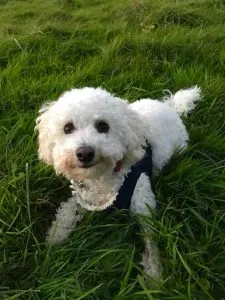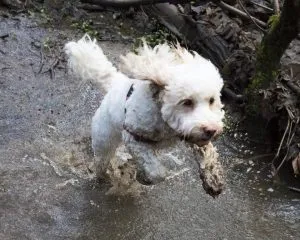Last Updated on May 29, 2025 by Simon James
The Cockerpoo (or Cockapoo)
Updated 28th November, 2023
Below are important facts to get you started on the important decision about whether the Cockerpoo breed is going to be compatible with your lifestyle and fulfil your expectations.
Before I get into the facts, are you wondering where to find a Cockapoo Puppy? My List of Breeders by region is here.
This site also specialises in Rescue Cockapoos and you can check by region here.
You also may have heard a lot about Cockapoo Rage Syndrome but don’t let that put you off this wonderful dog breed.

Cockerpoo Facts
1. In Australia the Cockapoo is known as a Spoodle or Cockerdoodle and in Sweden the name is spelled Cockerpoo. The correct spelling is ‘Cockapoo’
2. The Cockerpoo is believed to have originated in 1950’s America when a American Cocker Spaniel was bred with a Poodle.
3. The Cockerpoo is referred to as a cross breed or hybrid dog
4. The Cockerpoo is very popular in the UK and USA which has made it a popular choice for amateur breeders who “puppy farm” the breed to make a quick profit
5. The Kennel Clubs do not recognize the Cockerpoo as a breed in its own right
6. It’s difficult to estimate how many Cockerpoos exist but Google data shows that in the UK 146,480 people search for “Cockerpoo” every month compared with 112,360 searches from the USA and 4,570 searches in Australia. I think we can deduce that the UK has the highest demand for Cockerpoos in the world!
6.1 38% of people begin their search for a puppy over the internet so be careful, be smart, and read this article first.
6.2 Cockerpoo’s from a reputable breeder aren’t cheap, but don’t pay too much or too little.

Cockapoo Appearance
7. Due to the differences in Poodle size and colour, no “standard” Cockerpoo has been achieved. However, they can be categorized as:
8. A Standard size Cockerpoo– approx max weight 20 lbs and approx 15 inches tall
9. A Miniature size Cockerpoo – approx max weight 13 – 18 lbs and approx 11 – 13 inches tall
10. A Toy size Cockerpoo – approx 12lbs and max height of 12 inches
11. A Teacup size Cockerpoo – approx 6 lbs and 10 inches tall

The Cockapoo Coat
12. A first cross (F1) breed will result in some puppies exhibiting more poodle traits than Cocker Spaniel. This means some coats are more akin to fur than hair.
13. The hair on Cockerpoos ranges from straight to curled. Look at the many colours, but the most popular coat colour is black.
14. Cockerpoos may also have a merle coat, (where random portions are diluted to create a mottled appearance). These are common in the USA but not in UK
15. A Cockerpoo’s fur is hypoallergenic– meaning they don’t set off an allergic reaction in people.

Cockapoo Grooming & Care(Grooming tips)
16. Cockerpoos are a low dander, low shedding dog (a trait inherited from the Poodle)
17. Cockerpoos with dominate Poodle genes will need to be clipped, while Cockapoos with dominate Cocker spaniel genes have hair that will not to be cut
18. A Cocker-Style coat should be brushed daily to avoid kinking in the hair
19. A Poodle-Style Coat needs trimming on a regular basis (every 6 – 8 weeks)
20. Bathing should only be done when necessary to keep the coat’s natural oils and lustre.
21. Cockerpoo owners should pay particular attention to their large floppy ears that require regular cleaning to prevent infections
22. If cared for properly Cockerpoos are relatively odourless.

Cockapoo Breeders[Breeders Pages]
23. An F1 Cockapoo is the first cross with a American or English Cocker Spaniel and a Poodle
24. An F2 Cockerpoo is the off-spring of two F1 Cockapoos
25. An F3 Cockerpoo is sired when an F2 is bred to another F2
26. An F1b or F2b is where a Cockerpoo is bred back to either a Poodle or a Cocker Spaniel giving (depending on which generation the parents were)
27. Cockapoo Club GB, American Cockapoo Club and Cockapoo Club of America are the official breed clubs and exist to safeguard and improve the breed
28. A Cockerpoo breeder can determine everything about the size, coat and colour of the dog…but not the sex
29. There are 27 registered breeders the UK
30. Cockerpoos are less prone to genetic diseases than pure bred dogs. However, If the sire (male) and dam (female) are not screened before mating, they can pass a genetic disorder to the off-spring
31. The most common genetic disorder for the Cockerpoo is PRA (Progressive Retinal Atrophy) which causes blindness
32. Others common genetic disorders are: Von Willebrand disease (vWD), a bleeding disorder; retinal dysplasia, eyes; phosphofructokinase (PFK) which affects the muscles; familial nephropathy (FN), renal disease, hip dysplasia, hip joints; primary and secondary glaucoma, (primary glaucoma is a inherited eye disorder).

Cockerpoo Exercise
33. Cockerpoos only need light exercise but they should go out on a walk at least once a day for 30 minutes
34. Because of their compact size they are suitable for apartment style living
35. They are also known for their agility and love swimming. You will get the most out of your Cockerpoo when regularly exercised
35.1 An early, structured exercise programme is very important fora puppy. As well as the right Cockapoo dog food.

Cockerpoo Temperament
36. The temperament of any dog is determined by two things; the genetic material of the parent and early socialisation experiences
37. Poodles are noted for their intelligence while Cocker Spaniels are very quizzical and friendly. These ingrained character traits are passed to the Cockerpoo
38. Cockerpoos get along with everyone (children and cats included); they are bred to be a companion dog.
39. Separation anxiety is common with Cockerpoos when left on their own for long periods; because they are companion dogs they expect company

Cockapoo Training
40. Because the Poodle is famed for its intelligence, Cockerpoos are easy to train
41. Like many dogs, positive reinforcement is the best way to train your Cockerpoo
41.1 Housingtraining, or potty training, is the first and most important training a dog owner undertakes. I have recently written quite a bit about how to housetrain your Cockapooif your needing help.
Cockaerpoo Health
42. The most common health complaints are: cataracts, patellar luxation, ear infections, liver disease, hip dysplasia, and allergies (these health complaints can develop in any Cockerpoo regardless of health screening)
43. A healthy Cockerpoo will have-
44. Healthy skin (flexible, smooth and pest free)
45. Coat (full and usually fluffy or glossy)
46. Body and weight (well covered with nice round tummy but able to feel ribs)
47. Eyes (bright and clear)
48. Ears (inside –clean and free from discharges)
49. Mouth, gums and teeth (gums firm and pink, teeth free from tartar, white and no evidence of damage)
50. Nose (cool and moist)
51. Normal temperature – 38.3 –39.2C
51.1 Grooming is also important for your Cockerpoo’s health

Cockerpoo Rescue dogs
52. A cockapoo will cost about £90-£200 at a re-homing shelter. Try these sites first
- RSPCA
- The Dogs Trust
- Battersea Dogs Home
- Wood Green Animal Shelters
- Blue Cross Re-homing Centre

Information can be found Cocker Spaniel Rescue can be found here.
53. lots of regular exercise! Dogs are happiest when they are out and about having fun with their owner. It creates a special bond between you and allows them to have the fun and excitement that they crave!
Conversely, lack of exercise is the worst thing you can do for any dog. They aren’t bred to be at home all day. They are natural pack animals that love company and using their agility to run, swim, chase, chew, sniff and play.
For a greater understanding of the Cockerpoo breed, My First Cockapoo is a good place to start. It contains a link to the updated UK registered breeding list.


